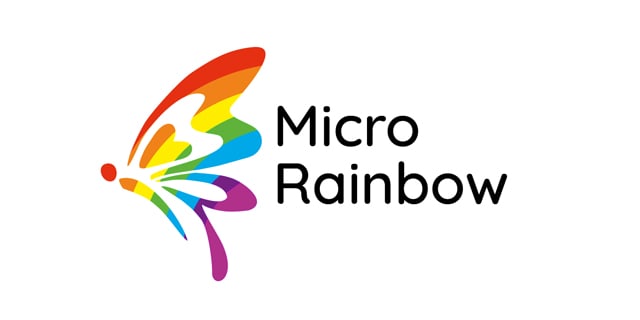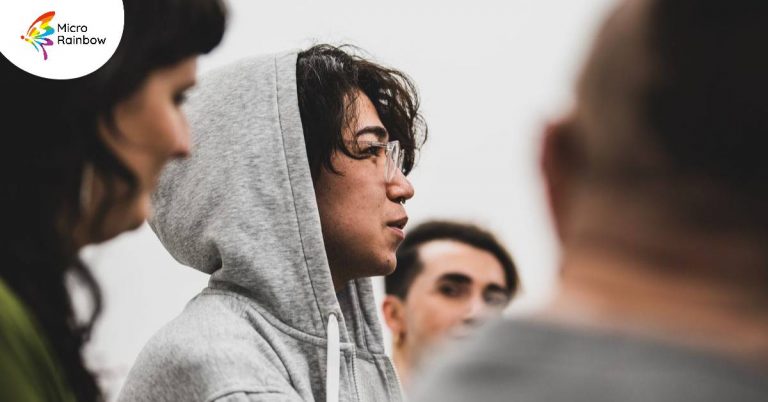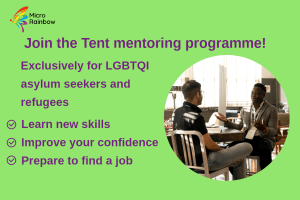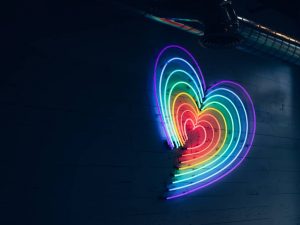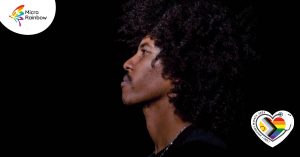Did you know that 46% of the people Micro Rainbow supported in 2023 were under the age of 30? Younger people seeking asylum in the UK based on their LGBTQI identity face many of the same challenges experienced by older people, but some are compounded by their youth.
Their age means they can be more vulnerable to exploitation, and that they can slip through the net in terms of services. Their education may have been interrupted hindering their chances to fulfil their full potential in life. They may lack the ability to access appropriate networks of support because of their LGBTQI identity or may be more susceptible to exploitation because of their youth.
As Khojimat explains below, they can also feel acutely isolated, especially if they have come from living in a family unit to then living alone, and with adults that they do not know. Social inclusion support from Micro Rainbow helps young LGBTQI people seeking asylum like Khojimat.
Khojimat’s story
I am Khojimat. I am 19, gay, and from Uzbekistan. I came to the UK to study on a student visa when I was 17. I didn’t know anything about claiming asylum at that point. It was only when I turned 18, that I started to learn a bit more about the process of claiming asylum, and the different reasons why people claim. At first, I didn’t know that you could claim because of your sexuality.
I did know that it is illegal to be gay in my home country, and has been since 1994. In Uzbekistan men can be punished with up to three years’ imprisonment. After being in the UK and living more openly, I knew that if I went back to Uzbekistan, I wouldn’t be safe because of my sexuality. I decided that going back wasn’t an option, and I decided to apply for asylum.
Living in a hotel
After applying for asylum, I was placed in a hotel in Croydon. I didn’t really feel safe there though. I like to express myself by painting my nails and wearing makeup. Sometimes I would be approached by children, and they used to ask me: “Are you a boy or a girl? Why do you wear makeup? Why do you dress up like a girl, why do you wear crop tops?”.
These kinds of questions would make me feel uncomfortable and exposed. I would also get messages on Grindr, from other men that were living in the hotel. They would make comments about the clothes I had been wearing. It made me feel like I was under surveillance, like I was being watched. I didn’t feel safe. I recently moved to a new place, however, and I feel safer and more able to express myself.
A young LGBTQI person seeking asylum
I feel that younger people seeking asylum in the UK experience greater challenges in terms of social isolation in comparison to older people. As young people, we suffer more with the wait for our claims to be processed because we often have to miss out on education during this time. I have been waiting more than eight months for my substantive interview, and it is really impacting my mental health. At times, it has made me feel suicidal.
I have provided all the evidence that the Home Office asked for, and did this months ago. But still, I am waiting to find out when my interview is, and even after that I will have to wait for a decision. I know that for me, and other young people like me, the waiting is really the hardest bit.
More mental health support is needed for young people like Khojimat
There are many other young asylum seekers arriving in the UK at a tender age, possibly leaving behind parents who they cannot reunite with until their asylum status is determined. The separation from family and the enduring uncertainty, which can stretch over years, undoubtedly takes a toll on their well-being. Restrictions on work and travel further exacerbate the situation. The prolonged wait in a state of constant uncertainty until their claim is decided increases the risk of mental health issues, including heightened tendencies towards suicidal thoughts.
In my view, there is a crucial need for specialised assistance for LGBTQI refugees and asylum seekers. Many have faced severe hardships such as torture, persecution, and familial rejection in their countries of origin. Mental health support for young asylum seekers would make a big difference. There are many groups that help asylum seekers, and LGBTQI asylum seekers, but there is not enough support for mental health. Upon arrival in the UK, LGBTQI organisations should offer support to address their mental health challenges stemming from their past traumas.
Missing home
I miss my home country a lot. When I came here, I was only 17 and it was stressful for me, being away from my family. I am still in contact with my family. But not everyone knows why I am here, and why I am claiming asylum. My mother knows about my sexuality, but not everyone, they might be guessing about my sexuality though, I am not sure.
Deciding to claim asylum was really tough because I knew it would mean that I might not see some of my family again – such as my grandparents, who are too old to travel. And I love my home country, our historical places and history and culture. It is hard to be away. But I cannot be myself or be safe there.
Finding the Micro Rainbow community
Attending Micro Rainbow events, workshops and activities has helped me to find friends and a new community of LGBTQI people. I took part in the employability workshops through the Moving On programme about how to write my CV, interview skills also attended dance, yoga, and the mental health workshop. The workshops and events help me to feel less isolated.
I try and keep myself busy. After attending the employability workshops, Micro Rainbow gave me a laptop, and this has made things easier. Now I can spend my time reading articles, learning things online and watching TV. I attend a lot of events and activities for young asylum seekers and am trying to stay positive about the future. Crucially, thanks to Micro Rainbow’s employability and social inclusion support and while I wait to secure refugee status, I can prepare myself for the job market and explore educational opportunities as well. I can start imagining a life after the asylum process.
Help more LGBTQI young people like Khojimat who are seeking asylum
Support more young people like Khojimat who are seeking safety and security in the UK – become an ally today.
